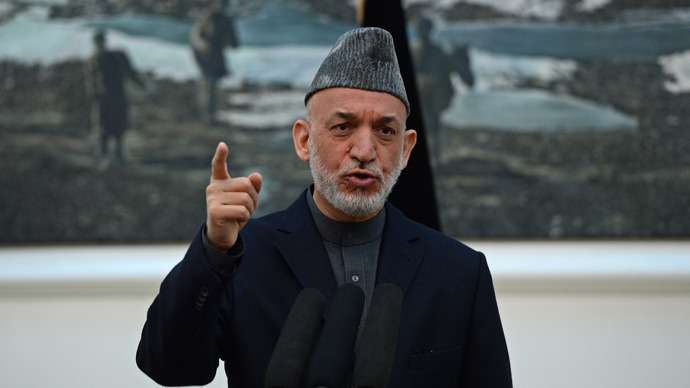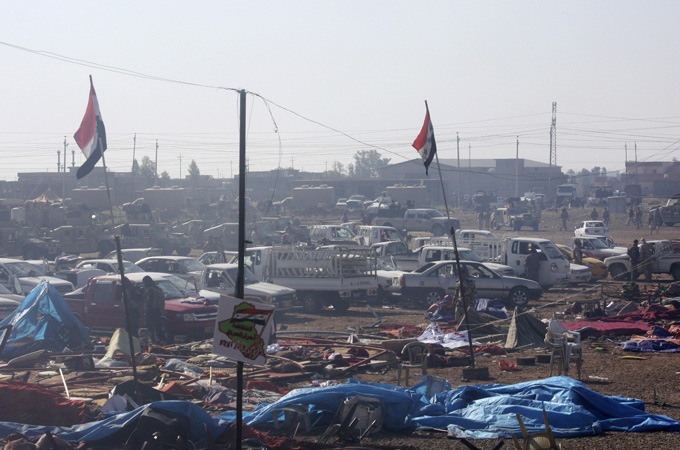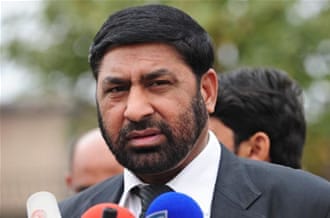http://www.aljazeera.com/video/asia/2013/05/20135333253931522.html
http://www.aljazeera.com/news/middleeast/2013/05/20135491011260586.html
Pakistan prosecutor in Bhutto case shot dead |
Gunmen kill Chaudhry Zulfiqar Ali in Islamabad on his way to a hearing over former prime minister's murder.
Last Modified: 03 May 2013 19:54
|
Gunmen killed Pakistan's main government prosecutor on the Benazir Bhutto murder case in Islamabad before escaping on a motorbike, police said.
State prosecutor Chaudhry Zulfiqar Ali was shot in the head, shoulder and chest in the attack on Friday as he was driving to a hearing in the murder case of the former prime minister, who was assassinated in 2007.
Bullets hit the lawyer at least 13 times, and his car was left pockmarked and with a shattered windshield, police officer Arshad Ali said.
The attack happened in broad daylight in a busy street in a middle-class neighbourhood of the Pakistani capital.
His bodyguard was also wounded and a woman was killed when Zulfiqar lost control of his vehicle, police said.
Bhutto's husband, President Asif Ali Zardari, strongly condemned the prosecutor's slaying and called for a thorough investigation.
A motive for the killing was unclear, but his involvement in two particularly high-profile cases will likely be scrutinised closely.
Security requested
Zulfiqar was also leading the investigation into a case related to the 2008 terrorist attack on the Indian city of Mumbai that killed 166 people.
The attack was blamed on the Pakistan-based group Lashkar-e-Taiba. Pakistan has put seven men on trial on charges they assisted in the Mumbai siege, but the trial has made little progress.
Zulfiqar was scheduled to appear in an anti-terrorism court in the neighbouring city of Rawalpindi on Friday, according to Al Jazeera's Kamal Hyder in Islamabad.
Our correspondent said Zulfiqar had recently requested additional security from the ministry of interior “because of the high-profile case that he was investigating.”
“However, none of that was given and only one guard was riding with him,” Hyder said.
Musharraf house arrest
On Tuesday, ex-military ruler Pervez Musharraf was placed under a two-week house arrest over charges that he conspired to murder the former prime minister, who was at the time campaigning for election.
Musharraf denies being involved in Bhutto's killing, and his government blamed it on Pakistani Taliban chief Baitullah Mehsud, who denied any involvement and was killed in a US drone attack in 2009.
Bhutto's son, Bilawal Bhutto Zardari, chairman of the outgoing main ruling Pakistan People's Party, has accused Musharraf of her murder.
In 2010, a UN report said Bhutto's death could have been prevented and accused Musharraf's government of failing to give her adequate protection.
Zulfiqar's colleagues described him as a highly competent prosecutor.
"He had a vast experience of handling complicated and high-profile cases and because of his competence he was assigned the Benazir Bhutto case and some other cases," said Ashraf Gujar.
Afghanistan troubles..... Karzai denies CIA cash bought support of Afghan warlords, asks US to continue payments
Published time: May 04, 2013 14:44

Hamid Karzai (AFP Photo / Massoud Hossaini)
Afghan President Hamid Karzai denies that CIA cash delivered to his office each month was used to buy the support of warlords who could tip the country into another civil war. Karzai insists the cash was used for above-board purposes.
Karzai’s statement comes less than one week after The New York Times alleged that Afghan top officials had been receiving payments from the CIA and that some of those funds were used to bribe warlords into supporting Karzai’s US-backed government, ahead of NATO’s troop withdrawal next year.
While Karzai openly admitted to receiving the cash, he adamantly denied that any of it was used to buy the loyalty of warlords. Instead, he said the money – which was allegedly packed in suitcases, backpacks, and plastic shopping bags – was used for such causes as healthcare and scholarships. "This money was not given to warlords," he told a Saturday press conference in Kabul. "The major part of this money was spent on government employees such as our guards...it has been paid to individuals, not movements…we give receipts for all these expenditures to the US government." Karzai declined to confirm just how much money his office received each month from the CIA, although he previously stated that the cash was a "small amount." “Yes, the office of the national security has been receiving support from the United States for the past 10 years,” Karzai said in an earlier statement. “Monthly. Not a big amount. A small amount which has been used for various purposes.” However, Karzai’s former and current advisers said that tens of millions of dollars were given to the leader over the past decade. Despite protests in Washington and criticism from Afghan opposition groups, Karzai asked US officials on Saturday to continue the cash deliveries. "Just this morning I met with the station chief of the CIA in Kabul and I thanked him for the support given to us in the past 10 years and I asked him to continue the support," Karzai said. He added that the money was "flowing to" Afghanistan's intelligence agency, the National Directorate of Security. "In the situation of Afghanistan where there is so much need...it proves extremely helpful." After 11 years of fighting in Afghanistan, international experts worry that NATO’s planned 2014 pullout will leave Kabul unable to survive a Taliban onslaught – and that Karzai’s government won’t last without US support. A report by a British Ministry of Defense think tank, which was released in March, said NATO troops will leave Afghanistan in a fragile state. “The country will again be left with a severely damaged and very weak economic base, heavily dependent upon external aid,” the report said. Iraq heading to civil war - or is the civil war already underway ? http://www.blacklistednews.com/%E2%80%9CIt_is_wrong_to_say_%5BIraq_is%5D_getting_close_to_a_civil_war%E2%80%A6_The_civil_war_has_already_started.%E2%80%9D/25772/0/38/38/Y/M.html “It is wrong to say [Iraq is] getting close to a civil war… The civil war has already started.”May 3, 2013
By Jon Queally, Common Dreams
“It is wrong to say [Iraq is] getting close to a civil war… The civil war has already started.” That’s what one Iraqi politician tells the Independent’s Patrick Cockburn as the British foreign correspondent explores the undercurrents of growing violence and political conflict in the country still reeling and destabilized from more than a decade of war and an entire generation beset by Western sanctions, military intervention, and occupation. If things in Iraq continue to deteriorate, the politician predicts the results “will be worse than Syria.” April in Iraq was the most deadly month in more than five years and many Iraqi politicians inside the country and outside experts are now saying that its not a question of when a civil war will break out, but that the violence now being witnessed proves a civil war—in many ways—is already underway. As Cockburn reports: The situation has suddenly deteriorated since the killing of at least 36 Sunni Arab protesters at a sit-in in Hawijah on 23 April. An observer in Baghdad, who did not want to be named, said “ever since, Hawijah people are frightened of a return to the massacres of 2006.” She added that Sunni and Shia were avoiding going into each others’ areas. Signs of deteriorating security are everywhere. Al-Qa’ida showed its reach on Monday when five car bombs blew up in overwhelmingly Shia southern Iraq, leaving 21 dead. The Sunni fundamentalist group, which had a resurgence in 2012, is responsible for killing a majority of the almost 1,500 Iraqis who have died in political violence so far this year.Earlier this week, a report titled Mission Unaccomplished, released by the UK-based War Child, found that the situation inside Iraq was “one of the world’s most neglected” ongoing crises and warned that a “total collapse of the state” remained a distinct possibility if the situation did not improve. But, if Cockburn’s reporting accurately reflects the dynamics inside Iraq, it appears that the situation is about to get dramatically worse, not better. He spoke with one high-level official within the Kurdistan Regional Government (KRG) in the north who described just how bad things have become, especially regarding the growing Sunni insurgency that is fueling a large amount of the recent violence. “The western part of the country is caught up in an uprising against the government,” said Fuad Hussein, the chief of staff of the KRG President Massoud Barzani. “We don’t want to have a second Syria here and we are heading in that direction. The fire is very bad and we don’t have many firemen.” And Cockburn expands on how the crisis in neighboring Syria is “cross-infecting” the tensions and violence inside Iraq, writing: The two-year-old uprising of the Sunni in Syria encouraged their compatriots in Iraq, who share a common frontier, to start their own protests. These began last December and, until the army killed and injured scores of protesters at Hawijah, were largely peaceful. |
http://www.aljazeera.com/news/middleeast/2013/05/20135491011260586.html
Iraq pressured to step up raid probe |
Human Rights Watch calls for greater financial and political backing in government investigation into Hawija raid.
Last Modified: 04 May 2013 11:02
|

HRW said it received disturbing images of the aftermath of the crackdown on the protest camp in Hawija [Reuters]
|
| Human Rights Watch has urged Iraqi authorities to give a government committee charged with probing a deadly raid by security forces on a protest camp last week greater financial and political backing to investigate who is responsible for what it described as an apparently unlawful use of lethal force. On Saturday, the group also said it received photos from a separate, parliamentary investigation allegedly taken in the aftermath of the attack that showed the bodies of several men lying in the protest area amid burning cars. Some have their hands bound and "appear, because of the way the bodies are positioned, to have been executed with gunshots,'' the group said. The April 23 action against the Sunnis in Hawija who were protesting against the Shia-led government unleashed a backlash of deadly attacks by Sunnis, and battles between gunmen and security forces that have claimed more than 250 lives. Before the Hawija crackdown, local and tribal officials had been trying to negotiate a peaceful end to a standoff between protesters and security forces. Authorities had wanted to enter the camp to hunt for weapons and make arrests related to an earlier incident in which a nearby checkpoint came under attack. Iraqi forces opened fire only after they were attacked, according to the Defense Ministry. It said 23 people, including three members of the security forces, were killed in the clashes. It said "only insurgents and extremists remained" in the camp before it moved in, and that some of the dead included fighters with ties to al-Qaeda and Saddam Hussein's outlawed Baath Party. The Defense Ministry has said security forces opened fire only after they came under attack while trying to make arrests. Hours after the raid, Prime Minister Nouri al-Maliki ordered the creation of a ministerial committee to investigate the incident. A parliamentary committee is also probing what happened at Hawija. Human Rights Watch obtained a preliminary copy of the parliamentary investigation's findings. It said the committee determined that the crackdown by security forces on the Hawija camp killed at least 44 civilians. All were killed by live fire, and at least one of the dead was 13 years old, Human Rights Watch said. The committee's casualty figures are similar to ones provided by Deputy Prime Minister Saleh al-Mutlaq, who leads the separate ministerial committee that is also investigating the Hawija incident. His office said 46 people not on the side of security forces, including minors, were killed. Gathering information Al-Mutlaq's committee has based its findings primarily on interviews with government officials and on photographs from the scene. He acknowledged difficulties in speaking to witnesses among the protesters because they are afraid to participate in the process. The parliamentary committee inquiry, meanwhile, is based in part on interviews with witnesses who were at the protest. It did not talk to soldiers who were at the scene because it claims it was prevented from doing so by their superior officers, according to Human Rights Watch. The parliamentary committee report "indicates that senior officials gave orders for army, federal police, and SWAT forces, all of which fall under Maliki's military office, to invade the demonstration site, remove demonstrators and level tents," the rights group said. While it alleges that senior officials, including al-Maliki, may have ordered the raid, "it does not address what orders they issued concerning the use of force," according to the group. Al-Maliki's spokesman, Ali al-Moussawi, denied that any orders were given to fire on protesters. "There is no need to ask who issued the orders, because those orders did not exist in the first place," he said. |
Source:
|





No comments:
Post a Comment